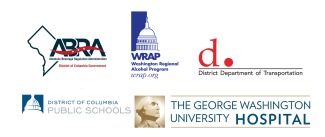Workplace Rights Grant Program
Fiscal Year 2024 Grants
Through a competitive process four grants were awarded to four DC based organizations, DC Jobs with Justice , First Shift Justice Project, Many Languages One Voice, and the National Reentry Network for Returning Residents under the Workplace Rights Grant Program.
DC Jobs with Justice (DC JWJ): DC JWJ is a dynamic coalition of labor organizations, community groups, faith-based organizations, and student groups dedicated to protecting the rights of working people, supporting community struggles, and promoting racial justice to build a more just society. It is committed to the creation of living wage jobs, support of economic and social justice here and abroad, and maintaining pressure to demand corporate accountability in communities, and creating a fair and just future for communities of color.
Through the “DC JWJ Outreach Program” DC JWJ seeks to provide high quality multilingual worker outreach efforts by conducting Know Your Rights education and presentations to District workers in fields at highest risk of wage theft, specifically those who speak non-English primary languages (Spanish, Amharic, Chinese, French, and Vietnamese), and with low literacy, building on the successful partnerships and strategies of the Just Pay DC Coalition. The proposed work will also provide workplace rights education workshops on topics such as employment laws, tipped wages, minimum wage laws, wage theft prevention, paid family leave and paid sick leave.
First Shift Justice Project (FSJP): FSJP is a nonprofit organization that helps working parents in low wage jobs assert their workplace rights to prevent job loss. FSJP serves clients who work all over the Washington Metro Area, with a specific emphasis on outreach to D.C. residents in Wards 4, 5, 7 and 8. First Shift Justice Project serves caregiving workers by using a preventive, client-centered approach to reach families, educate them about their rights, and enable them to exercise their rights without shame. By educating and supporting working parents to assert their rights before they lose their jobs or their workplace stress becomes untenable, First Shift helps them safely maintain their employment, their health, and their family commitments.
Through the “D.C. Paid Leave Access and Enforcement Project” First Shift Justice Project seeks to prevent job loss, especially for working mothers in low wage jobs in Wards 4,5,7 and 8 with a specific focus on DC workers’ rights laws: D.C. Family Medical Leave Act (DCFMLA), Universal Paid Leave Amendment Act (UPLAA), and protecting Pregnant Workers Fairness Act (PPWFA). The proposed work will provide 175 direct individualized legal services, conduct community outreach, and give Know Your Rights presentations to aid the public’s awareness and the enforcement of the laws mentioned above. The organization’s Know Your Rights education presentations will be given in collaboration with other community organizations in D.C., such as Community of Hope, Mary’s Center, Briya Public Charter School, Mamatoto Village, and Bread for the City. Legal services are tailored to each client’s individual circumstances and goals and aim to provide clients the support she needs to effectively exercise her rights.
Many Languages One Voice (MLOV): MLOV is a BIPOC immigrant-led organization that empowers low-income immigrant communities of color in Washington, DC to access opportunities, impact change, and advance immigrant rights. It seeks to address the needs of its members and amplify their voices to find solutions to the systemic inequities that impact their lives. Founded in 2010, MLOV’s mission is to foster leadership and greater civic participation of immigrants who do not speak English as a primary language.
Through the “Ensuring Multilingual Access to Workplace Rights” MLOV seeks to provide high-quality workplace rights outreach, education, and promote the implementation of inclusive DC employment laws to low-income, high-risk industry, and limited English proficient workers, by centering the program on a language justice lens. This proposed work will also integrate workers education and engagement in its existing cohort program, which engages community members over periods of 5 - 18 weeks. MLOV proposes conducting workplace outreach, community canvassing, and social media outreach in six targeted languages: English, Spanish, Amharic, Chinese, French, and Vietnamese, and engage workers in various high-risk industries including: construction workers, day laborers; domestic workers; early childhood educators, home-based providers; beauty industry workers; and restaurant/hospitality workers.
The National Reentry Network for Returning Citizens (NRNRC): NRNRC is an organization for returning citizens by returning citizens. NRNRC vision is to reinvest in safe and healthy communities, create more living wage jobs, permanent housing, and economic self-sufficiency for returning citizens. The organization’s mission is to build a strong, national network comprised of individuals returning from incarceration who support each other's reintegration. It uses client centered approaches to identify basic needs and to create a continuum of care that can address barriers to reentry, promote restorative practices, and reduce recidivism.
Through the “Workplace Rights for Returning Citizens” NRNRC seeks to provide workplace rights outreach to returning residents by integrating workplace rights education into its job readiness program, Ready4Work, which connects returning citizens with workplace competencies and employment opportunities. This training program offers financial literacy, resume and interview preparation, job search skills, effective communication and conflict resolution skills, emotional intelligence, and self-development strategies. Additionally, NRNRC will continue its partnership with The Washington Lawyers' Committee Workplace Rights Clinic to provide free legal advice to returning residents, concerning workplace rights. The organization will also conduct workplace rights outreach, education, and campaigns to unions via its partnerships with Local 400 and Local 25, key employers of returning residents in the District, halfway houses, and DC jails.
Fiscal Year 2023 Workplace Rights Grant Program Achievements
DC Jobs with Justice: "Just Pay DC Workers Rights Outreach Program"
In FY23, DC JWJ successfully executed outreach to workers and residents at most risk of wage theft. It circulated over 11,000 fliers, held over 22 trainings, and trained over 375 people. It reached over 228 workers in high-risk industries. 609 eligible DC residents were reached across targeted occupational groups and/or geographic areas. The organization joined many community events including Coffee and Conversation at Mt Pleasant Library, Jobs Not Guns job fair, in the Kenilworth Parkside community. In partnership with Long Live Gogo, DC JWJ organized Gogo musical tours to different high schools in the District to promote key workplace rights issues relevant to high schoolers including the minimum wage and tipped minimum wage. It made significant strides in expanding language access of its program, especially for Spanish speaking workers. The organization made significant investments in reaching Spanish-speaking populations through its paid media and contracting. It also translated and updated its “Know Your Rights DC” programing and informational materials in Spanish, French and Amharic. Through its fellowship program, the organization was able to conduct extensive street outreach and trainings on commercial corridors in Ward 1 in Spanish, Hindu, Amharic, and French. DC JWJ’s work has led to several introductions and investigations for OAG’s Public Advocacy Division (PAD). These includes the current active investigation with eight masonry workers, who indicated stolen wages; the current case with Intercontinental/Moon Rabbit, and PAD was provided with 48 restaurants that reported to DOES that they had paid a base wage below the tipped minimum wage at the time.
First Shift Justice Project: “D.C. Workplace Leave Access and Enforcement Project”
In FY23, First Shift conducted 16 Know Your Rights presentations in English and Spanish to 371 participants both independently and in collaboration with its community partners. These presentations focused on the rights of undocumented workers who are facing pregnancy discrimination in the workplace, how to access the federal paid family leave and Family Medical Leave Act benefits, the workplace rights of caregivers, how to transition back to the workplace after birth and how to request accommodations, and First Shift’s scope of services for direct legal services. First Shift trained 108 medical and healthcare staff through eight trainings. Through First Shift’s trainings, community events, and other outreach efforts, it distributed a total of 2944 materials, brochures, and fact sheets, 1091 of which were distributed exclusively at events located in its target communities. In collaboration with its communications consultant, Boss Blueprint, First Shift’s had a reach of 14,105 across its media platforms. The organization served 158 clients with direct legal services. From the 158 clients served, 111 cases were closed resulting in the following outcomes: 12 clients were assisted in applying for paid family leave benefits; 30 clients received their requested leave and/or accommodations; 9 clients received approximately $68,652 in monetary damages; 4 clients maintained their jobs; 2 clients were reinstated; 1 client received unemployment benefits; and 53 clients received the tools and information they needed to self-advocate for their rights within their workplaces.
Fiscal Year 2023 Grants
In Fiscal year 2023, starting October 1, 2022, through a competitive process two grants were awarded to two organizations, First Shift Justice Project, and DC Jobs with Justice (DC JWJ) based in the District under the Workplace Rights Grant Program.
First Shift Justice Project (FSJP): FSJP is a nonprofit organization that helps working parents in low wage jobs assert their workplace rights to prevent job loss. FSJP serves clients who work all over the Washington Metro Area, with a specific emphasis on outreach to D.C. residents in Wards 4, 5, 7 and 8. First Shift Justice Project serves caregiving workers by using a preventive, client-centered approach to reach families, educate them about their rights, and enable them to exercise their rights without shame. By educating and supporting working parents to assert their rights before they lose their jobs or their workplace stress becomes untenable, First Shift helps them safely maintain their employment, their health and their family commitments.
Through the “D.C. Workplace Leave Access and Enforcement Project” First Shift Justice Project seeks to prevent job loss, especially for working mothers in low wage jobs in Wards 4,5,7 and 8 with a specific focus on DC workers’ rights laws: D.C. Family Medical Leave Act (DCFMLA), Universal Paid Leave Amendment Act (UPLAA), and protecting Pregnant Workers Fairness Act (PPWFA). FSJP will provide individualized direct legal services, conduct community outreach, and give Know Your Rights presentations to aid the public’s awareness and the enforcement of the laws mentioned above. The organization’s Know Your Rights education presentations will be given in collaboration with other community organizations in D.C., such as Community of Hope, Mary’s Center, Briya Public Charter School, and Carlos Rosario International PCS’ Adult Education program. Its individual legal services are tailored to each client’s circumstances and goals and aims to provide clients the support they need to effectively exercise their rights.
DC Jobs with Justice (DC JWJ): DC JWJ is a dynamic coalition of labor organizations, community groups, faith-based organizations, and student groups dedicated to protecting the rights of working people, supporting community struggles, and promoting racial justice to build a more just society. It is committed to the creation of living wage jobs, support of economic and social justice here and abroad, and maintaining pressure to demand corporate accountability in communities, and creating a fair and just future for communities of color.
Through the "Just Pay DC Workers Rights Outreach Project” DC Jobs with Justice seeks to provide high quality multilingual worker outreach efforts by providing Know Your Rights education to District workers in fields at highest risk of wage theft, specifically those who speak non-English primary languages (Spanish, Amharic, Chinese, French, and Vietnamese) building on the successful partnerships and strategies of the Just Pay Coalition and working as a subgrantee during FY 22,with our funding to Many Languages One Voice. DC JWJ will also provide workplace rights education workshops on topics such as employment laws, minimum wage laws, wage theft prevention, paid family leave and paid sick leave.
Fiscal Year 2022 Workplace Rights Grant Program Achievements
First Shift Justice Project: “D.C. Workplace Leave Access and Enforcement Project”
Throughout this grant period, First Shift Justice Project served 56 clients by providing access to legal services. Most of the DC residents served were in wards one, five and seven. 30 opened client matters were closed, seven clients maintained their jobs or were reinstated, seven received accommodations or leave that totaled 43.5 additional weeks of paid leave; three received Paid Family Leave benefits; and a total of $17,750 was received in monetary damages.
First Shift’s online outreach included a total of 4,639 website visits with 3,580 unique visits and an audience reach rate of approximately 147,227. There were also181,685 impressions across Instagram, Twitter, and Facebook. First Shift trained 40 medical and healthcare staff at Unity Health Care, Mary’s Center, Whitman-Walker Health, and Mamatoto Village.
Many Languages One Voice (MLOV) in partnership with DC Jobs with Justice (DC JWJ) and Restaurant Opportunities Center DC (ROC-DC): “Ensuring Multilingual Access to Workplace Rights program”
Through the FY22 implementation year, one major accomplishment from the grant was the recruitment and training of twenty-one part-time canvassers who were able to speak Spanish, French, Chinese, and Amharic, to match the needs of project’s target populations. Through the efforts of the multilingual canvassing team, 400 worker contacts were collected leading to 70 follow-ups requiring access to legal resources and/or services. The team disseminated 1,675 flyers through their community outreach efforts, including at workshops, worksites, and targeted events. Over 10,000 workers were reached through this project.









